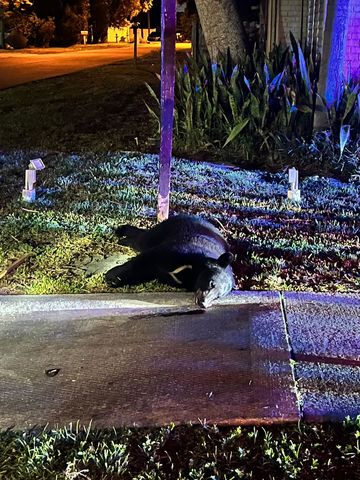UPDATE: A statement on how FWC deals with trapping bears has been added to this post.
Bear Watch 2023 is over: We are so sad to share that the young juvenile bear that made its way through multiple Orlando neighborhoods and hearts this week was hit by a car on Edgewater Drive near Fairbanks Avenue late last night and died.
Orlando Police shared with Bungalower that that section of Edgewater Drive falls within Winter Park and is outside of their jurisdiction. They also shared that they had no information on a car accident involving a bear.
FWC biologists have been observing the bear, hoping it would make its way out of town on its own, on its own time, which is the standard operating procedure for the state agency. A number of traps were put out each day but the bear managed to evade them as it continued on its way through town.
Today, the FWC shared the following statement with us:
“Florida Fish and Wildlife Conservation Commission (FWC) bear biologists have been closely monitoring the movements of a juvenile black bear in Orlando since Monday, April 24. Unfortunately, the bear was hit and killed by a car on Fairbanks Ave. in Orlando today, April 27.
Black bears have been reported in the downtown Orlando area each year, particularly during the spring when bears are more active and juvenile bears are starting to leave their mother’s home range. Typically, these bears have moved along out of the city on their own and this is the first time that a dispersing bear has been hit by a car in the city of Orlando, based on reports to the FWC.
In this situation, attempts were made to try and trap the bear for relocation but the bear continued to be on the move. Each situation may be different, but generally it is best practice for bears to be given plenty of space so that they will move away on their own.
To learn more about bears and how to avoid conflicts with them, visit MyFWC.com/Bear or BearWise.org.”
– FLORIDA FISH AND WILDLIFE CONSERVATION COMMISSION
The FWC gets an estimated 5,000-6,000 bear-related calls each year and according to an interview by Tampa Bay 10 in 2022, only 2% of those calls require the FWC to trap the bear in question, and even fewer cases call for using a tranquilizer when the bear isn’t already inside of a trap.
Our bear biologists always try to minimize risks when capturing bears. Chemical immobilization drugs can take time to affect the animal or may not completely immobilize them, and in those cases, the animal can potentially run off, creating an unsafe situation for both the bear and the public.
When trying to anesthetize an animal that is high up a tree, there is also always the risk of injury if they fall to the ground as the drug takes effect. Bears can also get stuck in the tree as they fall, creating an unsafe situation for both the bear and responders.
The safest method of capture is by using a bear trap and is the least risky option for the both the bear and the public. In this situation, attempts were made to try and trap the bear for relocation but the bear continued to be on the move. Each situation may be different, but generally it is best practice for bears to be given plenty of space so that they will move away on their own.
– FLORIDA FISH AND WILDLIFE CONSERVATION COMMISSION
A reader sent a photo of the bear, confirming its death, when it was found on the side of the road after apparently being struck by a car. Orlando Police were on the scene this morning. We’ve tucked the photo down at the bottom of this post.
.
.
.
.
.
.
.
.
.
.
.



This makes me so sad. The person that hit him didn’t call it in?
Since the bear was being followed …. why the hell wasn’t he tranquilized and relocated? Short of that, there was no happy ending for this poor fellow. Someone messed up bad and should be held accountable. : (